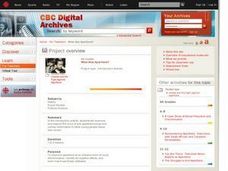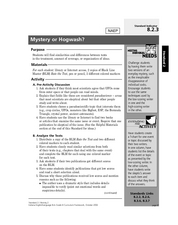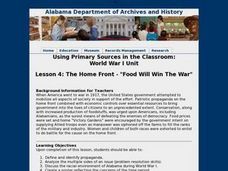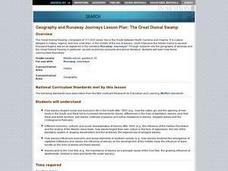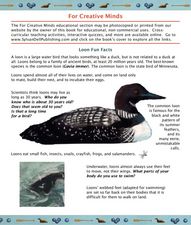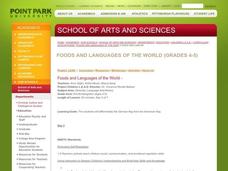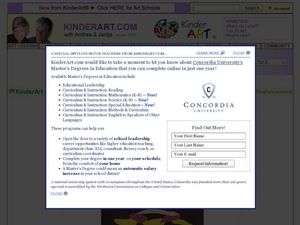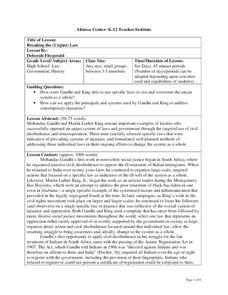Curated OER
What Was Apartheid?
Students research and discuss the former system of Apartheid in South Africa and focus on worldwide anti-Apartheid movements. They identify anti-Apartheid songs and present the lyrics to the class.
Curated OER
Mesoamerica
Students demonstrate knowledge of early Middle American civilizations. They study Mesoamerican i religions, governments, and achievements. They identify geographies of North and South America.
Curated OER
Human Rights/Civil Rights
Learners connect their examination of the novel Roll of Thunder, Hear My Cry to a historical and contemporary study of the issue of human rights and civil rights by creating a HyperStudio stack.
Curated OER
Exploring Tolerance and Related Essential Questioning on Acceptance and Diversity
Learners explore the concept of diversity. They discuss ways in which people differ. Students visit various websites and discuss the vocabulary words found on these sites. They read stories from various countries and discuss the people...
Curated OER
Gettysburg: The Civil War's Costliest Battle
Students research the Civil War and the Battle of Gettysburg. In this Gettysburg lesson, students analyze journals and letters written by the Gettysburg soldiers. Students define Civil War soldier vocabulary words. Students compare and...
Curated OER
Basic Orienteering
Students study orienteering. In this science instructional activity, students study the parts of a compass and use the compass to set a bearing and follow the bearing on the compass.
Curated OER
Explanation Expedition
In this clever research lesson, student groups research certain cultural aspects of a foreign country, and fill out a worksheet with notes. In this note taking lesson, 5th graders write about the environment, entertainment, art, and...
Curated OER
Human Computer Game
Students view the "Parts of a Computer" Power Point presentation then they view the inside of a computer and break down each operating system and its job. They compare and contrast the difference between human and computer parts that...
Curated OER
Mystery or Hogwash?
Eighth graders choose topics of interest, and select books from the library about them. They utilize a worksheet embedded in the text which has the students rate the text they've read based on it's "believability factor." An interesting...
Curated OER
Chancing it
Seventh graders examine different transplant types and estimate the possible outcomes. In this biology lesson students discuss donors and transplants then divide into groups and complete a worksheet.
Curated OER
The Home Front - "Food Will Win The War"
Students define and identify propaganda. They analyze the multiple sides of an issue (problem resolution skills), then discuss the racial environment of Alabama during World War I. They reate a poster reflecting the concerns of the time...
Curated OER
THE GREAT DISMAL SWAMP
Learners analyze how slavery shaped social and economic life in the South after 1800, the different economic, cultural, and social characteristics of slavery after 1800, and slavery both prior and after the Civil War.
Curated OER
Three Coffles Lesson Plan
Students read about the slave trade in primary source documents. They discuss differences and commonalities in experiences. They write prose or poetry from the point of view of one of the figures from the reading and create a triptych.
Teaching Tolerance
The Power of Words: Ethnic Stereotypes
Pupils study stereotypes that are associated with different ethniciites or regional groups. They examine how occupations can be hypothetically related to ethnic sounding names.
Curated OER
Living on a Cotton Farm: Mexican Americans Life In Texas
Seventh graders are introduced to the processes of cotton farming in the early 20th century. In groups, they examine the role of Mexican Americans on the farms and the impact of a boom and bust economy on cotton. They identify the...
Curated OER
Parts of a Computer
Students, after identifying the parts of a computer, and categorizing the parts by functions (input, output, process, and storage), explore how all the parts of a computer work together. They compare/contrast the differences between...
Curated OER
School Day: South Africa
Students explore a student protest in South Africa. They observe a film about life in South Africa. Students consider how the image of South Africa is shaped by the media. Students roleplay interviewing African children.
Curated OER
Using Political Cartoons and Propaganda in Teaching the Holocaust
Students gain an understanding of the Holocaust through analysis of political cartoons. In this Holocaust activity, students examine propaganda in political cartoons that were used in Nazi Germany.
Curated OER
Loon Fun Facts
Third graders learn about loon fun facts. In this loon lesson, 3rd graders read three pages of facts about loons and their habitats. They read Native American myths about loons and make a loon mask using the attached worksheets.
Curated OER
Foods and Languages of the World
Learners compare and contrast the German flag to the American flag. In this diversity lesson, students view an example of the German flag and American flag. Learners list the differences and similarities between both flags. Students...
Curated OER
Hamburger Collage
Students review shapes and their cutting skills by making a hamburger collage. In this shapes lesson plan, students identify shapes that make up the food in a hamburger, cut out the food from construction paper, and create a collage out...
Curated OER
Our Unfinished Work
Students investigate the racism elements after the election of President Barack Obama. In this racism lesson, students read a recent article about 'post-racial' society. Students compile a list of achieving a post-racial society and...
Curated OER
Translating African Masks
Students identify traits of African masks. In this multicultural art lesson, students view online examples of African masks and discuss the characteristics of the masks. Students create an original 2-D version of the African mask by...
Curated OER
Breaking the Unjust Law
Students consider the concept of civil disobedience. In this lesson on changing unjust laws, students use primary sources to understand how Gandhi and King changed the law. Students will then list laws that they feel are unjust and plan...


